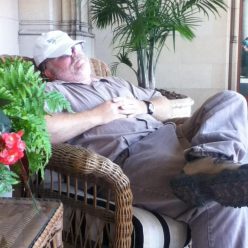
This is the anti-abortion psalm, used to argue that life begins at conception: “For You formed my inward parts; / You covered me in my mother’s womb,” the Old Hebrew psalmist says to YHWH.
Then, the psalmist adds, “Your eyes saw my substance, being yet unformed. / And in Your book they all were written, / The days fashioned for me, / When as yet there were none of them.” Oh?
But there’s more. This particular “Psalm of David” speaks to YHWH’s omniscience: “For there is not a word on my tongue, / But behold, O Lord, You know it altogether.” YAH is always listening.
Also, to YHWH’s omnipresence: “If I take the wings of the morning, / And dwell in the uttermost parts of the sea, / Even there Your hand shall lead me….” I’ve read that in quite another context.
The first two lines — the ninth verse — are the epitaph of another man who thought he could fly above the law, not just ours, but those of his god and all humanity, as well as his marriage vows.
Those words are chiseled into a flat, gray stone marking a grave covered by volcanic gravel and wilted leis, in a humble churchyard sitting steps from the most awe-inspiring view I’ve ever seen.
Charles Lindbergh — famed aviator, American hero — was an antisemite and Nazi sympathizer in the 1930s and ‘40s, forming seven lives with his three German “wives” in the 1950s and ‘60s.
Whoever said, “Be sure your sins will find you out and your chickens come home to roost,” didn’t know how lucky Lindy was, because this fellow with no fear of flying got to die on his own terms.
Men like Lindbergh — I hesitate to call them “great” — should read this entire psalm, not just the lines they like; then they’d realize that life is more than a fertilized egg, or even a frozen embryo.
